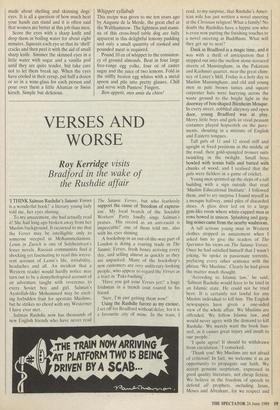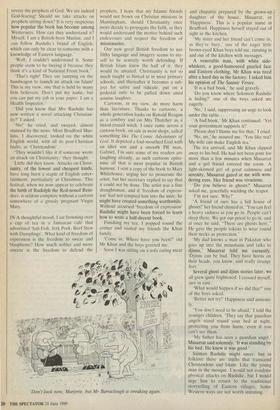VERSES AND WORSE
Roy Kerridge visits
Bradford in the wake of the Rushdie affair
'I THINK Salman Rushdie's Satanic Verses is a wonderful book!' a literary young lady told me, her eyes shining.
To my amazement, she had actually read it! She had long ago broken away from her Muslim background. It occurred to me that the Verses may be intelligible only to someone steeped in Mohammedanism. Lenin in Zurich is one of Solzhenitsyn's lesser novels. Russian communists find it shocking yet fascinating to read this irreve- rent account of Lenin's life, irritability, headaches and all. An incident that a Western reader would hardly notice may turn out to be a demythologised account of an adventure taught with reverence to every Soviet boy and girl. Salman's Ayatollah-like Mohammed may be excit- ing forbidden fruit for apostate Muslims, but he strikes no chord with any Westerner I have ever met.
Salman Rushdie now has thousands of new English friends who have never read The Satanic Verses, but who fearlessly support the cause of 'freedom of express- ion'. My local branch of the Socialist Workers' Party loudly sings Salman's praises. 'His record as an anti-racist is impeccable!' one of them told me, also with his eyes shining.
A bookshop in an out-of-the-way part of London is doing a roaring trade in The Satanic Verses, fresh boxes arriving every day, and selling almost as quickly as they are unpacked. Many of the bookshop's new customers are very unliterary-looking people, who appear to regard the Verses as a tract in 'Paki-bashing'.
'Have you got your Verses yet?' a huge Irishman in a trench coat roared to his friend.
'Sure, I'm just getting them now!'
Using the Rushdie furore as my excuse, I set off for Bradford without delay, for it is a favourite city of mine. In the train, I read, to my surprise, that Rushdie's Amer- ican wife has just written a novel sneering at the Christian religion! What a family! No doubt the Rushdies have a hippie son who is even now putting the finishing touches to a novel sneering at Buddhism. What will they get up to next?
Dusk in Bradford is a magic time, and it was with a thrill of anticipation that I stepped out into the mellow stone-terraced streets of Manningham, in the Pakistani and Kashmiri quarter, near the great chim- ney of Lister's Mill. Friday is a holy day in Muslim Manningham, and old and young men in pale brown tunics and square carpenter hats were hurrying across the waste ground to the bright light in the doorway of box-shaped Blenheim Mosque. In every street, cobbled alleyway and open door, young Bradford was at play. Merry little boys and girls in vivid peasant costumes played hopscotch on the pave- ments, shouting in a mixture of English and Eastern tongues.
Tall girls of 11 and 12 stood stiff and upright in fixed positions in the middle of the road, their gold-spangled trouser suits twinkling in the twilight. Small boys bowled with tennis balls and batted with chunks of wood, and I realised that the girls were fielders in a game of cricket.
Young men sprinted up the steps of a tall building with a sign outside that read 'Muslim Educational Institute'. I followed them, and to my surprise I found myself in a mosque hallway, amid piles of discarded shoes. A glass door led on to a large gym-like room where white-capped men in rows bowed in unison. Splashing and garg- ling noises came from the nearby washroom.
A tall serious young man in Western clothes stopped in amazement when I asked him to give the readers of The Spectator his views on The Satanic Verses. Once he had satisfied himself that I wasn't joking, he spoke in passionate torrents, prefacing every other sentence with the phrase 'We Muslims'. Clearly he had given the matter much thought.
'According to Islamic law,' he said, 'Salman Rushdie would have to be tried in an Islamic state. He could not be tried here. It is certainly not lawful for any Muslim individual to kill him. The English newspapers have given a one-sided view of the whole affair. We Muslims are offended. We follow Islamic law, and would never agree with the demand to kill Rushdie. We merely want the book ban- ned, as it causes great injury and insult to our people.'
'I quite agree! It should be withdrawn from circulation,' I remarked.
'Thank you! We Muslims are not afraid of criticism! In fact, we welcome it as an opportunity to propagate our faith. We accept genuine scepticism, expressed in good quality literature, not cheap fiction. We believe in the freedom of speech to defend all prophets, including Jesus, Moses and Abraham, for we respect and revere the prophets of God. We are indeed God-fearing! Should we take attacks on prophets sitting down? It is very suspicious how popular the book has become among Westerners. How can they understand it? Myself, I am a British-born Muslim, and I can follow Rushdie's brand of English, which can only be clear to someone with a knowledge of Eastern language.'
'Well, I couldn't understand it. Some people seem to be buying it because they think it's a kind of National Front book.'
'That's right! They are jumping on the bandwagon to launch an attack on Islam! This is my view, one that is held by many firm believers. Don't put my name, but you can put my job in your paper. I am a Health Inspector.'
'Did you know that Mrs Rushdie has now written a novel attacking Christian- ity'?' I asked.
'No!' he cried, and swayed, almost stunned by the news. Most Bradford Mus- lims, I discovered, looked on the white English world, with all its post-Christian faults, as 'Christendom'.
'They wouldn't like it if someone wrote an attack on Christianity,' they thought.
Little did they know. Attacks on Christ- ianity, of the lowest and cheapest kinds, have long been a staple of English enter- tainment, particularly at Christmas. This festival, when we now appear to celebrate the birth of Rudolph the Red-nosed Rein- deer, is seldom complete without a cartoon somewhere of a grossly pregnant Virgin Mary.
IN A thoughtful mood, I sat frowning over a cup of tea in a Jamaican café that advertised 'Salt Fish, Jerk Pork, Beef Stew with Dumplings'. What kind of freedom of expression is the freedom to swear and blaspheme'? How much nobler and more sincere is the freedom to defend the prophets. I hope that my Islamic friends would not frown on Christian missions in Manningham, should Christianity once more decide to propagate the faith, as they would understand the motive behind such endeavours and respect the freedom of missionaries.
Our new great British freedom to use filthy language and imagery seems to my- self to be scarcely worth defending. If British Islam knew the half of it, they would he amazed. Christianity is not so much taught as hinted at in most primary schools, and thereafter it becomes a sub- ject for satire and ridicule, put on a pedestal only to be pulled down amid asinine laughter.
Cartoons, in my view, do more harm than literature. Thanks to cartoons, a whole generation looks on Ronald Reagan as a cowboy and on Mrs Thatcher as a blood-crazed witch. I once came across a cartoon book, on sale in most shops, called something like The Comic Adventures of God. It depicted a foul-mouthed God with an idiot son and a smooth PR man, Gabriel. I'm sure some of my readers are laughing already, as such cartoons epito- mise all that is most popular in British humour. I sent a copy of the book to Mary Whitehouse, urging her to prosecute the artist, but her secretary replied to say that it could not be done. The artist was a fine draughtsman, and if 'freedom of express- ion' had not tempted him into the mire, he might have created something worthwhile. Without accursed 'freedom of expression' Rushdie might have been forced to learn how to write a half-decent book.
Finishing my tea, I popped round the corner and visited my friends the Khan family.
'Come in. Where have you been'?' old Mr Khan and the boys greeted me.
Soon I was sitting on a sofa eating meat
'Don't look now, Marjorie, but Mr Barraclough is streaking again.' and chapattis prepared by the grown-up daughter of the house, Musarrat, or 'Happiness'. This is a popular name in Bradford. Happiness herself stayed out of sight in the kitchen.
'My sister and her friend can't come in, as they're busy,' one of the eager little brown-eyed Khan boys told me, running in and out of the kitchen with messages.
A venerable man, with white side- whiskers, a good-humoured gnarled face and Eastern clothing, Mr Khan was tired after a hard day in the factory. I asked him his opinion of The Satanic Verses.
'It is a bad book,' he said gravely.
'Do you know where Solomon Rushdie is hiding?' one of the boys asked me eagerly.
'No,' I said, suppressing an urge to loOk under the table.
'A bad book,' Mr Khan continued. 'Yet your government supports it!'
'Please don't blame me for that,' I cried. `No, no,' he assured me. 'You like tea? My wife can make English tea.'
The tea arrived, and Mr Khan slipped away to his bed. He had not been gone for more than a few minutes when Musarrat and a girl friend entered the room. A light-skinned girl of great calmness and serenity, Musarrat gazed at me with won- dering eyes. Her friend was vivacious.
'Do you believe in ghosts?' Musarrat asked me, gracefully wielding the teapot. 'I'm not sure. Why?'
'A friend of ours has a full house of ghosts!' her friend chimed in. 'You can feel a heavy sadness as you go in. People can't sleep there. We got our priest to go in, and at once he said, "There are ghosts here." He gave the people tokens to wear round their necks as protection.' 'My dad knows a man in Pakistan who goes up into the mountains and talks to djinns,' Musarrat told me earnestly. 'Djinns can he bad. They have horns on their heads, you know, and really strange feet.'
Several ghost and djinn stories later, we all grew quite frightened. I crossed myself, just in case.
'What would happen if we did that?' one of the boys asked.
'Better not try!' Happiness said anxious- ly.
'You don't need to be afraid,' I told the younger children. 'They say that guardian angels stand round your bed at night, protecting yOu from harm, even if you can't see them.'
'My father has seen a guardian angel,' Musarrat said solemnly. 'It was standing by his bed. He knew it was good.'
Salman Rushdie might sneer, but in folklore there are truths that transcend Christendom and Islam. Like the young man in the mosque, I would not condone physical attacks on Rushdie, but I would urge him to return to the traditional storytelling of Eastern villages. Some Western ways are not worth imitating.











































































 Previous page
Previous page